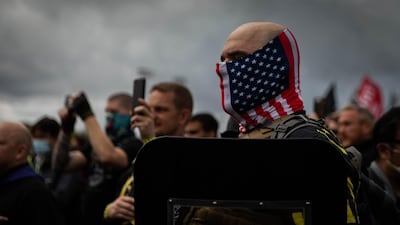Revelations that FBI agents thwarted a plot by far-right militiamen to storm Michigan's capitol building and kidnap its governor have raised the stakes in what was already a tense United States presidential election.
The foiled plan to oust Michigan’s Democratic Governor Gretchen Whitmer followed months of sometimes-violent racial justice protests in US cities that in August led to the killing of two protesters by teenage militia member Kyle Rittenhouse in Wisconsin.
For many, the cocktail of racial hostility, political polarisation, widely-available assault rifles, economic hardship from Covid-19 and a Republican president whose re-election effort has featured vocal support for extremists, is a cause for concern.
The National spoke to analysts who said white supremacist groups are likely to assemble at polling stations and intimidate voters on November 3, but a bigger danger lies in any post-election debacle over disputed results and claims of voter fraud.
“The threat of violence from far-right groups is always there, but we’re now seeing a progression in rhetoric and public appearances and this incident in Michigan is a new low,” said Vegas Tenold, a researcher at the Anti-Defamation League, an anti-Semitism watchdog.
“We’re extremely concerned about violence and interference in the election.”
The FBI criminal complaint on the abduction of Michigan's governor reads like a Hollywood movie plot: fanatics huddled in a secret basement conspiring to storm government offices and stage a “treason” trial over Ms Whitmer’s strict coronavirus lockdown rules.
While the plan was foiled by an undercover agent, it has shone a spotlight on the growing presence and confidence of far-right white men, some with guns and military training, ahead of a contentious election.
Reports suggest the conspirators were linked to the Boogaloo Bois — a militant movement whose assault rifle-toting members attend protests wearing colourful Hawaiian shirts and believe the US is headed for a second civil war.
Other far-right groups include the Oath Keepers, an anti-government, gun-rights ensemble made up of former policemen and others, and the Proud Boys: self-proclaimed “western chauvinists” who are known for their Fred Perry shirts and anti-Muslim and misogynistic rhetoric.
Far-right groups were once active on Facebook and Twitter but account purges by mainstream social media sites have seen them migrate to the instant messaging platform Telegram and uncensored online venues like Parler and Gab.
A Department of Homeland Security report this week warned that white supremacists have been behind more lethal attacks on US soil than any other movement these past three years and remain the country’s deadliest domestic terror threat.
The document outlined extremists’ “longstanding intent” to target racial and religious minorities, non-heterosexual groups, politicians, leftists and multi-culturalists, often in pursuit of a white, American ethnostate.
At the other end of the political spectrum is Antifa, an amorphous left-wing anti-fascist movement with a hardcore, armed “black bloc” contingent. Followers have spearheaded protests against police violence and racial injustice this past year.
Clashes between the rival groups have escalated. In August, Mr Rittenhouse, 17, allegedly shot and killed two leftist protesters and injured a third with a military-style rifle at a race protest in Kenosha, Wisconsin. He faces homicide charges and claims self-defence.
Last month, police shot and killed Michael Reinoehl, 48, a self-declared anti-fascist activist who was being pursued for fatally shooting a right-wing counterprotester during weeks of race rallies and politicised street clashes in Portland, Oregon.
President Donald Trump was asked to disavow the Proud Boys and other groups at his first televised debate against Democratic challenger Joe Biden on September 29. Instead, he urged members to “stand back and stand by” this campaign season.
Critics accused Mr Trump of signalling for Proud Boys to rally behind him in the event of a disputed election; the president has since denied any knowledge of the group and denounced white supremacists.
Still, Mr Trump regularly raises fears of voter fraud, especially over mail-in ballots, without offering evidence. Republicans are mobilising thousands of supporters to monitor polling stations for irregularities in Pennsylvania, Florida, Wisconsin and other toss-up states.
Mr Tenold described sizeable Proud Boys chapters in Florida and Pennsylvania that are likely to join the election-monitoring “Army for Trump”, as it is known. It remains unclear how many members these groups can deploy, he added.
"There are too many, but not as many as they'd like to think," added Mr Tenold, the author of Everything You Love Will Burn: Inside the Rebirth of White Nationalism in America.
Thomas Zeitzoff, an American University associate professor who studies political violence and social media, said he expected more trouble at polling stations than in previous years, but was more worried about what happens afterwards.
Polls suggest Mr Biden leads Mr Trump by some 10 percentage points, but the high proportion of postal ballots being cast amid the Covid-19 pandemic could see results trickle in for days after November 3, particularly votes for Mr Biden.
"Unless there's a complete Biden blowout, we won't know the results on election night," Mr Zeitzoff told The National.
“We could see claims about absentee ballots and lawsuits being filed. I’m not worried about a civil war, but about tension on the streets and Trump using isolated incidents of shenanigans as a pretext to subvert the democratic process.”


